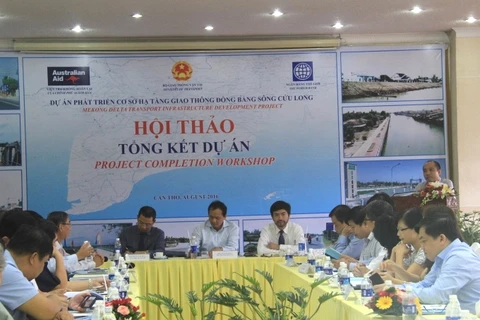 Co Chien Bridge between Ben Tre and Tra Vinh provinces in the Mekong Delta was built in 2015 (Photo: VNA)
Co Chien Bridge between Ben Tre and Tra Vinh provinces in the Mekong Delta was built in 2015 (Photo: VNA) HCM City (VNA) - Construction of two bridges linking Cao Lanh city and Lap Vo district in Dong Thap province and Dong Thap with Can Tho city, which are under way, will be a big boost to transportation and connectivity in the Mekong Delta.
But locals can look forward to further development of the transport infrastructure in the near future.
The delta is blessed with road, inland waterway, marine and air transport facilities.
The infrastructure for road transport is basically in place though admittedly most roads could do with improvements.
The inland waterway and sea modes are not optimally used yet since river and sea routes have not received adequate investment and a number of seaports have deposits of silt.
The delta has four airports, including two international facilities, which can meet the demand for air transport until 2030.
According to the Ministry of Transport, 46 transport projects, including 39 related to roads, have been taken up in the region since 2010 at a total cost of 76.46 trillion VND (3.4 billion USD).
Almost half the money for them was raised by issuing State bonds while another 19 percent came from the Government’s coffers. The rest came from private sources, mainly in the form of BOT (build-operate-transfer) road projects.
The air transport infrastructure has been developed by Vietnam Airlines and Vietnam Air Traffic Management Corporation.
A total 60.37 trillion VND has been invested in building and upgrading 1,036km of roads and 60.2km of bridges.
The completed transport infrastructure in the region includes the Can Tho, Ham Luong, Co Chien, My Loi and Nam Can bridges, the HCM City – Trung Luong and the Quang Lo - Phung Hiep Highways, and the South Hau River Road, all of which have helped improve connectivity between the delta and HCM City.
According to experts, transportation in the region still faces many challenges. The biggest challenge facing the Mekong transportation infrastructure development is raising the huge amounts required for major works like the HCM City – Can Tho Expressway.
It comprises two sections: one from the Trung Luong Three-road Intersection near HCM City to My Thuan Bridge in Vinh Long city, which is expected to cost nearly 9 trillion VND (400 million USD), and the other from My Thuan to Can Tho costing nearly 7 trillion VND.
Being the most important infrastructure project in the region, it will help connect the delta with HCM City, thus making the region and its products competitive.
Son Minh Thang, deputy head of the Steering Committee for Southwest Region, said relevant agencies have been trying to mobilise investments for the project.
Authorities are also seeking to raise funding for a section of National Highway No 60 between National Highway No 1A (in Soc Trang) and the HCM City – Can Tho Expressway, which would reduce the distance between HCM City and Ca Mau by 70km, helping the socio-economic development of the seven provinces in the eastern part of the delta, he said.
Priority in this project should be given to building the Dai Ngai Bridge and Rach Mieu Bridge No 2, he added.
Vo Hung Dung, director of the Vietnam Chamber of Commerce and Industry’s Can Tho Office, said only 1 percent of the investment in infrastructure had gone into developing inland waterway transport, the strong point of the region.
The money had mainly been spent on roads (79 percent) and shipping (13 percent), he added.
He urged the ministry to reverse course if it wants to strengthen the delta’s transport infrastructure and better connect it with other parts of the country.-VNA
VNA






















